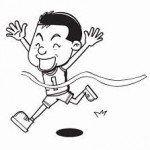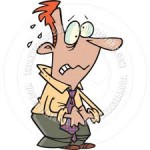 How to cure your depression or anxiety by understanding the importance of getting things in the right order (and then doing something about it!).
How to cure your depression or anxiety by understanding the importance of getting things in the right order (and then doing something about it!).
Depression horrible (I speak from experience), but there are many things you can do to cure your depression, probably the most important is understanding the dynamics between thoughts and feelings.
How often do you say to yourself “I don’t feel like going to the gym” or “I’ll do it when I feel like it”, or perhaps “I don’t feel like I can face it at the moment” or “I don’t feel up to it” or even, “I don’t feel like going out tonight”.
Have you ever stopped to think what it is that makes you “feel” like doing something?
On occasion, in my hypnotherapy sessions, when discussing what will help someone to feel happier, the client will come up with a positive action and I say “so when are you doing to do that then” and the answer comes back “when I feel like it”. I might then say “when are you going to feel like it?” and invariably the answer is “I don’t know”. Well of course you don’t know when you’re going to ‘feel’ like doing something.
The client with depression never feels like doing anything, and so their depression continues. The client with anxiety focuses on their fear of what might happen which them doing anything different.
They are getting the sequence wrong and that’s why nothing changes for them and they continue to experience the symptoms of anxiety and/or depression.
 I know I’m not the only one who has had the experience of not wanting to go out for an evening, perhaps it has been a long day, tired, stressed and I just ‘feel’ like slumping in front of the TV and doing nothing at all. However, I either can’t get out of it, don’t want to let someone down or it’s too late to cancel, so I haul myself out anyway planning my excuses for an early exit. Sound familiar? But what actually happens when you make that effort and go anyway? Invariably you have a great time, end up really enjoying yourself, getting your ‘second wind’ or a burst of energy and not leaving early at all. So what’s going on?
I know I’m not the only one who has had the experience of not wanting to go out for an evening, perhaps it has been a long day, tired, stressed and I just ‘feel’ like slumping in front of the TV and doing nothing at all. However, I either can’t get out of it, don’t want to let someone down or it’s too late to cancel, so I haul myself out anyway planning my excuses for an early exit. Sound familiar? But what actually happens when you make that effort and go anyway? Invariably you have a great time, end up really enjoying yourself, getting your ‘second wind’ or a burst of energy and not leaving early at all. So what’s going on?
Well, for a start, if I had followed my feelings, I wouldn’t have gone out at all, but for whatever reason I didn’t listen to my feelings, I decided I had to, despite my feelings, took action instead and did something, I went out and spent time with other people. By doing that, I created dopamine and serotonin in my brain and body which are vital in not only our mental but physical health.
Dopamine is responsible for the reward & motivation systems – in evolution terms, you would have got a ‘reward’ something which felt good, when you did something which helped you survive or evolve in some why, which then motivated you to do more of it. This is why you feel happy when you go out and spend time with friends and family and come away having promised “we must do that again soon”. Serotonin helps you cope with whatever life throws at you, makes you braver, helps you cope with physical fear, pain and boosts your immune system – again a natural evolutionary reward for doing the right things – a feel good reward.
So, actually, your feelings are a direct result of the hormones or neurotransmitters you produce when you are doing something and depending on what you are doing – or rather how you think about what you’re doing.
If you have or have had depression, you will understand how difficult it is to do anything, as the condition worsens, you do less and less, you don’t want to see anyone, you don’t want to do anything and people often do go back to bed, pull the duvet over the head and push the world away. You won’t help your depression by waiting until you feel like doing something, you will feel like doing something when you do something – you have the sequence wrong.
It’s a similar situation with anxiety at the opposite end of the scale. This time, instead of inactivity through not having sufficient dopamine or serotonin, the problem is manifested by the over production of stress hormones such as adrenalin which kicks off our fight/flight mechanism.
Our brain doesn’t know the difference between imagination and reality, so when we spend time imagining everything which could go wrong, or focusing our imagination on the problems, we are giving our brain the impression that something is wrong or could be wrong. It then produces the hormones which activate the systems to deal with impending danger or crisis and our brain will actively try and stop us from doing something which it considers is dangerous, it wont want us to step out of our comfort zone – in these times we hardly ‘feel’ like putting ourselves in a new situation or doing something different, in fact the opposite is going on, our brain is coming up with all sorts of propaganda to persuade us not to and giving us the feeling of fear, which isn’t so pleasant.
It was Eleanor Roosevelt who said “Do one thing every day that scares you”, of course it doesn’t have to be a big thing, but it is wonderful advice – how good do you feel when you have overcome a fear – massive reward of dopamine and serotonin, which does feels great.
Actors, sports people, getting on stage and speaking at an event – there are many many things which are hugely scary, even for those people who are putting themselves through it every day or for a living. What they are practiced at doing is acknowledging the adrenalin rush and channeling it to enhance their performance. That is what adrenalin is for, giving us an extra boost of strength and focus to enable us to perform better than our best when needed (when running away from an angry bear for example) and also for warning us of danger and getting our body ready for action.
People with anxiety, feel the adrenalin and acknowledge it as fear to stop them doing something, then they don’t get the dopamine and serotonin rewards that make them feel good.
The difference between that top sports person who can channel the adrenalin to enhance performance and the person with anxiety who can’t do things is the thought patterns, the way in which they think. To channel adrenalin all you have to do is think positively, for it to stop you from doing things, you need to think negatively.
For example:-
– feels the adrenalin surge
– acknowledges it and thinks ‘yes, I’m ready to win, I’m going to win’
– Wins
– Feels amazing and gets a super charged boost of dopamine and serotonin which then motivates them to do it again and do even better.
– feels the adrenalin surge
– feels scared and thinks about what is wrong, what could go wrong and dwells on the negatives
– doesn’t do whatever it was because they believe it will be a disaster to do so.
– Doesn’t get any reward or antidote to the adrenalin, but they have survived by not doing it which validates the non-activity and next time the same pattern repeats.
In both cases, depression and anxiety, the person has got the sequence wrong, they are led by the feelings and their activity follows the feelings. In both cases it actually starts with how they are thinking, whether it was positive or negative.
Negative thinking produces negative feelings which lead to inaction – no reward, no reason to do it.
Positive thinking produces positive feelings which lead to positive action or social interaction and you get rewarded with dopamine and serotonin which FEEL GOOD so you want to do it again.
Get the sequence wrong and lead with feelings, you wont do anything and nothing will change. Do you think we evolved by not trying anything new or not doing anything which scared us?
Hypnotherapy can help you to change your sequence and learn how to do things differently. To arrange a free initial consultation contact us.



